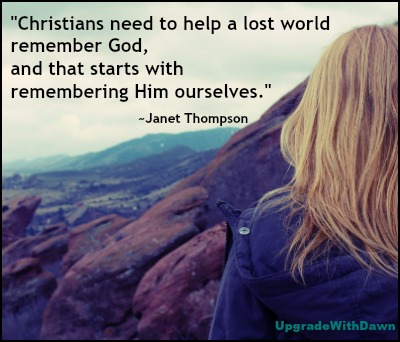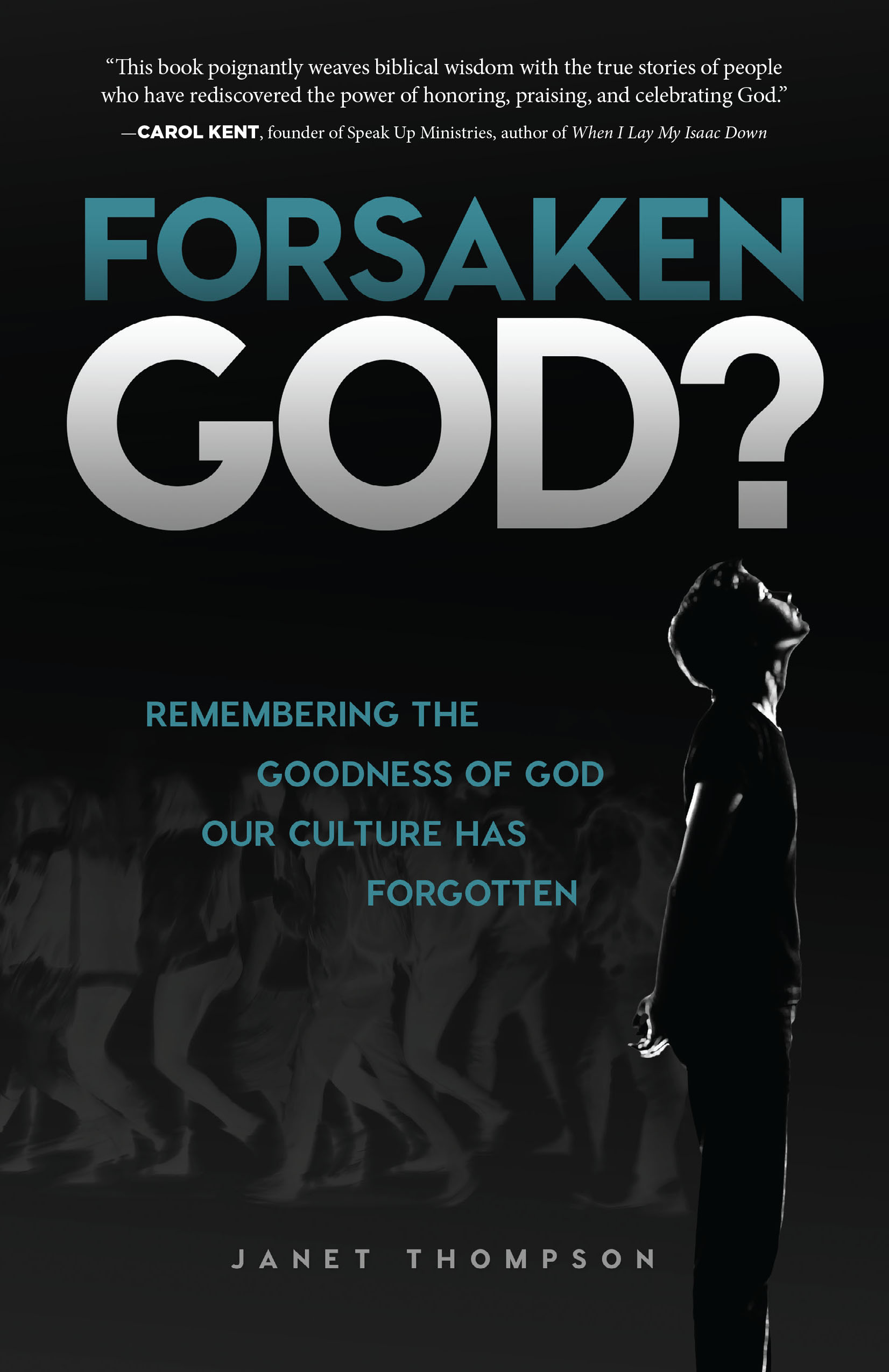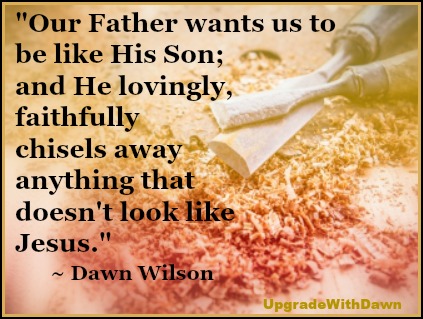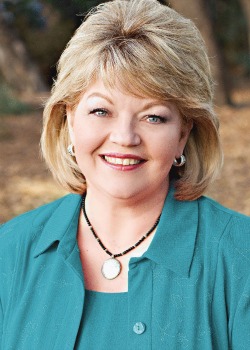Ways to Remember God's Goodness
In this Spiritual Life UPGRADE, Janet Thompson says our forgetfulness of God needs to stop with this generation!
“If we don’t remember what God has already done, we won’t believe what he is capable of doing in  the future.” Janet says. “Memory builds faith.”
the future.” Janet says. “Memory builds faith.”
I (Dawn) am excited with Janet’s new book on this topic—Forsaken God?—not only because I shared a story in the book*, but also because each story encourages us to remember our good and faithful Father God.
Janet continues . . .
Today’s culture is quickly forgetting the goodness and power of our Great God.
The Bible describes the potential destruction through all generations to people who forget God. The dangers are paramount. We read the Old Testament and lament at how forgetful the Israelites were of God’s goodness.
Every time He did something good for them, they started grumbling that they needed something else. They repeatedly rejected God, even though He:
- freed them from bondage and slavery by miraculously parting the Red Sea for them to pass through on dry ground,
- provided manna from heaven,
- guided them with a pillar of cloud by day and a pillar of fire by night,
- never let their shoes wear out even after walking for 40 years,
- and he offered them a land flowing with milk and honey.
God was only as good as the next miracle or provision. A forsaken God.
“But watch out! Be careful never to forget what you yourself have seen. Do not let these memories escape from your mind as long as you live! And be sure to pass them on to your children and grandchildren” (Deuteronomy 4:9 NLT).
We wonder at how the Israelites could be so blind and ungrateful. Why couldn’t they trust that a God who provided and protected them in the past, would do the same in the present and future?
But their memories were short. As often as Moses and God tried to help them remember, still they forgot. And at great sacrifice. The original generation freed from Egypt never got to see the Promised Land because they doubted God’s goodness. Even Moses wasn’t able to enjoy its beauty because at a crucial moment, he took matters into his own hands and forgot that God was in control.
We shake our heads at how dense and blind they were. But wait . . . can’t we be guilty of the same forgetfulness?
God has done amazing things in our lives too, but when the next crisis arises, we panic that He might not show up for us this time. Or when prayers are answered, we take credit ourselves or offer praise to someone else instead of giving God the glory and recognition He deserves.
But forgetfulness needs to stop with our generation. We live in a world that is quickly trying to eliminate God from the public square and even in the private domain.
Christians need to help a lost world remember God, and that starts with remembering Him ourselves.
In Forsaken God?: Remembering the Goodness of God Our Culture Has Forgotten, there are suggestions for ways to remember all that God has done in your life and then experience the power of sharing those memories in your sphere of influence and with the next generation.
One effective way is to share our testimony. As a Christian speaker, I give parts of my testimony every time I speak. “Feed my sheep” is my testimony of God clearly speaking those words to me. When I said an obedient “OK,” he revealed the "sheep" were women and "feeding" was mentoring.
That was 20 years ago, and today God has taken Woman to Woman Mentoring around the world as women enjoy the blessings of being in Titus 2 mentoring relationships. I still stand in awe as I write that story and every time I tell it from the stage. I will never forget how God used me to start a worldwide ministry and I give him the glory for the blessing it has been to so many.
But you don’t have to be a speaker to share your story.
Someone today needs to hear how Jesus changed your life. Our hurting world needs to hear from the Christian world the source of our joy and peace. Mentoring is a great way to share our testimony to encourage other women to know the Jesus of the Bible that we know.
In Forsaken God? there are over 50 ways to help us remember God.
Here are just a few:
- Taking pictures
- Journaling
- Reading our Bibles
- Receiving Communion
- Making a thankful list
- Joining a small group
What are some ways that help you remember God’s goodness?
Note: This article includes excerpts of Forsaken God: Remembering the Goodness of God Our Culture Has Forgotten, shared with permission. Dawn’s story appears on pages 121-122.
 Janet Thompson is an international speaker, freelance editor, and an award-winning author of 18 books including Dear God, They Say It’s Cancer and Praying for Your Prodigal Daughter. She is also the founder of Woman to Woman Mentoring and
Janet Thompson is an international speaker, freelance editor, and an award-winning author of 18 books including Dear God, They Say It’s Cancer and Praying for Your Prodigal Daughter. She is also the founder of Woman to Woman Mentoring and About His Work Ministries. Each chapter in her new book, Forsaken God?: Remembering the Goodness of God Our Culture Has Forgotten, includes questions and conversation starters for discussion in small groups, Bible study groups, book clubs, mentors and mentees or with family and friends. It is available at Christian bookstores, Amazon, Christianbook.com, and signed at author’s website.
About His Work Ministries. Each chapter in her new book, Forsaken God?: Remembering the Goodness of God Our Culture Has Forgotten, includes questions and conversation starters for discussion in small groups, Bible study groups, book clubs, mentors and mentees or with family and friends. It is available at Christian bookstores, Amazon, Christianbook.com, and signed at author’s website.
Graphic adapted, courtesy of pixabay.com.
 Post a Comment → Posted on
Post a Comment → Posted on  Thursday, February 11, 2016 at 7:50AM
Thursday, February 11, 2016 at 7:50AM  Forgetting God,
Forgetting God,  Forsaken God,
Forsaken God,  Forsaking God,
Forsaking God,  Janet Thompson,
Janet Thompson,  Remembering God's Goodness,
Remembering God's Goodness,  The Goodness of God,
The Goodness of God,  Upgrade with Dawn Upgrade Your Life
Upgrade with Dawn Upgrade Your Life  Relationship with God,
Relationship with God,  Revival,
Revival,  Spiritual Life
Spiritual Life 












